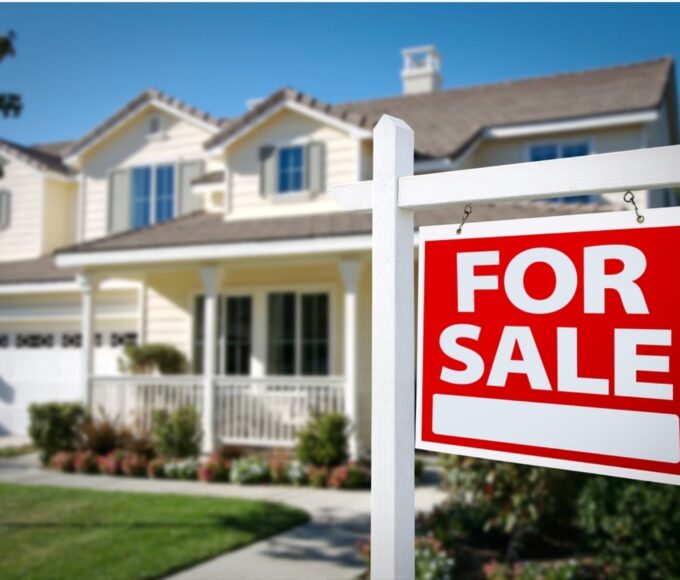When there’s a shortage of homes for sale, prices tend to increase. This is because the laws of supply and demand kick in. But it’s important to remember that rising home prices aren’t a given. They can and do drop. So, will home prices ever go down in the USA?
Supply and Demand
As with all markets, the law of supply and demand is a major force at work. When demand is stronger than supply, prices rise and the quantity of homes sold falls.
In the case of new houses, the underlying factor that drives demand is increasing real personal incomes. This, along with population growth, generally causes the demand curve for new houses to shift outward, but there are clear inward dips as well, as demonstrated by the spikes in mortgage payments shown in the chart above. These inward shifts are largely the result of recessions, which tend to impact incomes (along with other factors like employment and unemployment) and subsequently drive demand for housing down.
When demand outstrips supply, basic economics would dictate that suppliers of the goods in high demand would increase production to meet the increased demand, stabilizing prices and causing them to decline. Unfortunately, it’s not that simple in the case of homebuilding. Building a house takes a long time—7.2 months on average for a single-family home, and more than a year for an apartment building, according to government data. Additionally, homebuilders have been dealing with soaring input costs for construction materials that are driving up their final cost to build.
All of these factors have combined to create a seller’s market in which demand far exceeds available supply. It’s not hard to see why buyers are snapping up homes as fast as they can be listed—in fact, homes are selling for a premium above their asking price.
But if the Federal Reserve continues to raise interest rates, buyer demand could sink next year, and prices are likely to go down. On the other hand, if the Fed slows down its rate increases or expectations of a recession prove to be unfounded, prices and quantities for new houses might stabilize and begin to recover. That bodes well for companies like homebuilding giant D.R. Horton (DHI), but it also bodes less well for companies that provide the land on which new homes are built, such as Forestar. They might be able to pass on some of these rising input costs to their clients, but they can’t control them completely.
Interest Rates
Mortgage rates have a direct effect on home prices and the demand for real estate. However, there are many other factors that influence housing prices. These include inflation, economic conditions in other countries and a variety of local factors.
Inflation is one of the most significant influences on home prices. When inflation increases, it causes the price of consumer goods to increase as well. This is why it is important to keep an eye on the rate of inflation in your area. If you see that the inflation rate is higher than it should be, you may want to consider purchasing a home sooner rather than later.
As the economy grows, it can cause the interest rates to go up. This is because there is more money in the economy, so more people are willing to lend money. It can also affect home prices, as it is harder to afford a house when the mortgage rates are high.
However, if the inflation rate stays low, it can actually lead to lower home prices. This is because the cost of buying a home is lower when the interest rates are low, so more people are willing to purchase a home. This can create a balance between supply and demand that can prevent the prices from going too high.
Despite the recent uptick in interest rates, they still remain at historically low levels. This has impacted the affordability of homeownership, which has caused first-time homebuyer activity to decline. Additionally, rising interest rates can make it more difficult to sell a home, as potential buyers will have less buying power due to the higher financing costs.
If you are looking to buy a home, it is best to shop around for the lowest possible interest rates. However, if you can’t find a mortgage with a good rate, it is still worth buying a home. It is important to remember that the mortgage rate doesn’t have to last for 30 years, so if rates go up, you can always refinance at a lower rate in the future.
Inflation
Inflation is a big factor when it comes to home prices. It increases the cost of everything, including the price of land and construction materials. In addition, the cost of labor and utilities also increase with inflation. As a result, the cost of living rises and people have less money to spend on other things. However, the impact of inflation varies by person and area. This is because not all goods and services go up in price at the same rate. In fact, some even decrease in price as the manufacturing process becomes more efficient. This is why some goods actually end up cheaper than they were before, such as a carton of eggs.
In general, property prices tend to outpace inflation rates because there is a finite amount of space available to build homes and the population grows every year. In addition, homeowners often benefit from inflation as they can build equity by paying down their mortgage over time. As a result, they generally don’t feel the pinch of rising prices as much as renters and prospective buyers.
The biggest concern when it comes to housing inflation is that it makes it harder for would-be buyers to afford a home, especially as interest rates continue to rise. Inflation combined with sky-high mortgage rates has led to affordability issues in many markets. As a result, some experts believe that the demand for homes will slow down, leading to lower prices.
It’s worth pointing out that the median home price rose 10.3% last year while inflation increased by 6.3%. As a result, the gap between home prices and inflation is still quite large. In addition, the average American household’s income has only just kept pace with inflation. This means that even marginal home price decreases may not be enough to help cash-strapped Americans.
Fortunately, the recent spike in home prices is likely to be short-lived, and the market has started to cool down since Q4 2022. Still, the median home price remains high at $468,000. Even if prices decline slightly, it’s unlikely that it will be enough to make a home affordable for most Americans.
Taxes
Property tax rates vary widely from state to state, and localities can also implement differing property assessment practices. This means that a single homebuyer’s experience with property taxes is likely to be very different from another’s, even within the same municipality. This is the reason why it is so difficult to compare home prices and property tax rates across states, and a key factor contributing to the wide range of home price trends seen throughout the country.
Although national housing prices have begun to stall, property valuations still rose significantly over the past year, according to data from ATTOM. The combination of these two factors could cause property taxes to rise a bit faster than home prices over the next few years, leading to a modest increase in effective rate of property tax growth.
However, the effect of rising property taxes might be mitigated by other tax policy changes, including higher ordinary income tax rates. For example, the President’s proposal to limit itemized deductions to 28 percent might depress urban housing prices by increasing the marginal tax rate on homeownership-related expenses. Similarly, the President’s plan to reinstate capital gains taxes might have a similar impact.
In addition, local governments depend on property tax revenues to fund a variety of services. These costs may rise in tandem with the cost of housing, particularly in high-cost markets where home values have increased the most. This is true for both homeowners and renters.
As a result, if housing inflation continues at its current pace, many localities could face significant increases in their property tax rates over time. This will have the effect of discouraging new homebuyers, and it might also make existing homeowners rethink their decision to sell their homes.
It is important for prospective buyers to understand the relationship between housing and property tax rates. It is essential to consider these variables when comparing home prices, especially in high-cost markets. By taking the time to compare property taxes and home prices, potential buyers can better gauge the hidden costs of purchasing a home. This will help them avoid a costly surprise later on.

















Leave a comment